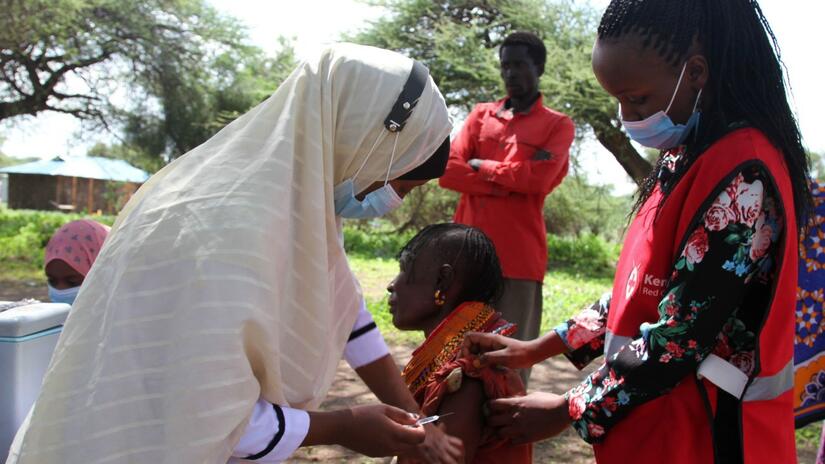Geneva, 7 March 2022 – Two years into the COVID-19 pandemic, as many countries are declaring the crisis chapter over, millions of lives are still at stake. Much of the world lacks the high vaccination coverage, strong healthcare systems or testing capacities to be able to transition to “a new normal”. Until everyone has access to the same tools to fight and recover from COVID-19, this crisis cannot be solved and will continue to impact everyone.
Francesco Rocca, President of the International Federation of Red Cross and Red Crescent Societies (IFRC), said:
“'Living with the virus’ is a privilege that many countries and communities around the world cannot enjoy. Ensuring equitable access to vaccines, diagnostics and treatments will not only save lives, but will also protect the world against the emergence of new and more dangerous variants. It is the only path to normalcy. None of us is safe until we all are.”
Red Cross Red Crescent staff and volunteers are working around the clock to bridge the equity gap ensuring that vaccines make it from the airport tarmac into the arms of vulnerable, at-risk, and marginalized individuals and communities. Their role is crucial, not just in helping people to get vaccinated, but also in informing communities, building trust, and dispelling misinformation about COVID-19 vaccines. Since the outset of the pandemic, they have reached over 300 million people through immunization activities.
In countries like Zambia, where health systems are fragile and rumors around vaccines are spreading fast, vaccine supply is just one of numerous obstacles. The Zambia Red Cross Society (ZRCS) has set up a mobile COVID-19 vaccination campaign, bringing vaccines directly to people in hard-to-access areas. Volunteers mobilize communities for vaccination, raise awareness about the mobile vaccination centers, provide information about vaccines and engage local leaders as advocates for healthy behavior change.
In Afghanistan, a new wave of infections is hitting hard, and the country’s health system is struggling to cope. Afghan Red Crescent is ramping up services at its health clinics across the country and its COVID-19 hospital in Kabul, while supporting nationwide vaccination efforts and running information campaigns on preventing the spread of the virus.
In the Pacific region, the virus is running rampant in several countries for the first time. This record surge of infections is threatening to overwhelm hospitals and health systems. In countries like Fiji and Vanuatu, with more than 165 inhabited islands, Red Cross volunteers have been travelling by car, boat and foot to reach remote communities to increase awareness about COVID-19 and get people vaccinated.
COVID-19 has not only thrived on longstanding inequities but also intensified them, pushed families into poverty, and increased domestic violence and mental health issues. Women, urban communities and migrants have been disproportionately affected by the devastating socioeconomic impacts. More than 5 million children have also lost a parent or another caregiver to COVID-19. Psychosocial support has been at the centre of our work, and volunteers are seeing a significant rise in mental health support needs.
Francesco Rocca, President of IFRC, said:
“This pandemic is not just a health crisis. Entire communities will continue to endure socioeconomic and mental health impacts for years to come. We cannot let COVID-19 become the disease of the world’s poorest and most vulnerable. It is critical that the global response and recovery include everyone and focus on building resilient communities and stronger health systems.”
For more information or to arrange an interview, contact:
In Geneva: Marie Claudet, +1 202 999 8689, [email protected]
In Geneva: Tommaso Della Longa, +41 79 708 43 67, [email protected]
Click here to learn more about the IFRC's COVID-19 emergency appeal.

